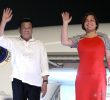In light of the death toll from Monday’s election violence, now over 40, political warlordism looms large.
By Carlos H. Conde
GlobalPost.com
Published: November 24, 2009 10:17 ET
Posted by Davao Today
MANILA, Philippines — Political violence on a scale never seen before has rocked the Philippines, with the brutal murders of 46 people, sparking new and grave concerns about the role of family dynasties in the country’s political system.
The victims — relatives of politicians, lawyers and several journalists — were abducted by around 100 armed men in Maguindanao province, in the southern Philippines. By Tuesday, 46 bodies had been recovered, according to police.
President Gloria Macapagal Arroyo placed two southern provinces under a state of emergency on Tuesday.
Many of the victims were beheaded and brutally shot and hacked, according to Esmael Mangudadatu, a vice mayor of a small town whose wife, sister and other kin were among those believed dead.
The incident blanketed the whole country with a sense of doom, made especially stark since Filipinos have been celebrating the recent victory of boxing phenom Manny Pacquiao and CNN’s selection for Hero of the Year, Efren Penaflorida, a young man who drives around a pushcart to teach poor kids how to read and write.
The gruesome violence was a brutal reality check that once again underscored just how deadly Philippine democracy can be and, perhaps more importantly, how little has been done to eliminate one of its scourges: political warlordism.
“[Monday’s] outrage brings this country closer to failed state status,” said Inday Espina-Varona, editor of the Manila newsweekly Philippine Graphic. It was a “brutal and barbaric display of naked power,” said Carlos Isagani Zarate, a lawyer from Mindanao, the main region in the southern Philippines. Two of Zarate’s colleagues who were lawyers of Esmael Mangudadatu were among those presumed dead. “This is a tragic commentary of our so-called democracy,” Zarate added.
While often exalted as the epitome of U.S.-style democracy in Asia, the Philippines has not quite lived up to the hype, if we go by the violence Filipinos witness every election season. In the 2007 midterm elections, more than 100 people were killed in election-related violence. In the 2004 elections, the number of deaths was even higher, at more than 200. But nothing — Zarate said not even during the dictatorship of Ferdinand Marcos — came close to the brutality of Monday’s attacks.
What made the incident more incendiary is the fact that at least a dozen journalists, who were covering the relatives of Mangudadatu as they went to the provincial capital to file his candidacy papers, were likewise killed, further cementing the Philippines’s notoriety as the most dangerous country in the world for journalists next only to Iraq. “Never in the history of journalism have the news media suffered such a heavy loss of life in one day,” the Paris-based Reporters Without Borders reacted in a statement.
Political families or dynasties, with their warlords and private armies, rule the Philippine political landscape, especially in the provinces. They are products of the Philippines’ colonial experience, with the Spanish and Americans nurturing them to protect each other’s interests. Even after the country gained independence in 1946, the system — which can only be described as feudal — persisted, with land-owning Filipino families forming their own dynasties, building their own private armies and running for public office to protect their interests.
According to the Center for People Empowerment in Governance, a Manila think tank, there are an estimated 250 political dynasties in the Philippines. Of the 265 members of Congress in 2007, it said in a report that year, 160 of them belonged to these powerful families.
In the same report, the center said these political dynasties almost singlehandedly engendered a culture of election fraud. “Fraud recycles the political dynasties and keeps them in power. It breeds generations of cheaters and manipulators, corrupt politicians, mediocre executives, bribe takers, absenteeism in Congress,” it said.
Apart from fraud, these dynasties flourish because Filipinos tend not to vote according to class, ethnicity, religion or even ideology. As a result, the Filipino family has become “the most enduring political unit and the one into which, failing some wider principle of participation, all other units dissolve,” wrote Brian Fegan, an American anthropologist and historian, in his book “An Anarchy of Families: State and Family in the Philippines.”
Monday’s violence is typical of the dynamic between Filipino political dynasties. The victims, the Mangudadatus, are themselves a powerful political clan in at least two Muslim provinces in Mindanao. Esmael Mangudadatu, the vice mayor of Buluan town, is challenging the governorship of Maguindanao province whose governor, Andal Ampatuan, belongs to the Mangudadatus’ main political rival. Esmael Mangudadatu alleged on Monday that the Ampatuans launched the attack to frustrate his attempt to become governor, which is perhaps the most important office that a political dynasty should have in order to remain in power.
Prior to this incident, there had been violent attacks perpetrated by either side and Esmael Mangudadatu, in television interviews on Monday, admitted that he had sent his wife and other female relatives to file his candidacy for him, thinking that his opponents would not harm women. He was wrong: The military says 13 of the 21 bodies they recovered Monday were those of Mangudadatu’s women relatives as well as his two women lawyers.
What made this case even more politically intriguing is the fact the Ampatuans are allies of President Gloria Macapagal-Arroyo. They have thrived in Maguindanao largely because of Arroyo’s patronage.
In the 2004 elections, Andal Ampatuan, who was already governor at the time, publicly promised to Arroyo that he would deliver most of Maguindanao’s votes for her and her party. He did, with two of the towns they controlled delivering zero votes to Arroyo’s opponent — sparking allegations of massive election fraud. In fact, the allegation that is hounding Arroyo — that she cheated her way to the presidency in 2004 — had its beginnings in Maguindanao province, with the Ampatuans allegedly behind the whole thing.
The Ampatuans had denied the election fraud charge. They have not issued any statement to refute the recent attacks, while Arroyo has promised to investigate the carnage and bring the perpetrators to justice.
In any case, there has always been a call over the years for government to dismantle these private armies. The latest one was sounded off by Amnesty International in a statement on Monday. “The government must prohibit and disband private armies and paramilitary forces immediately,” said Donna Guest, the group’s deputy director for Asia-Pacific.
Political movements have also been launched to break the stranglehold of political dynasties on Philippine democracy. These have had some few successes but, overall, the dynasties still rule.
In fact, Arroyo herself has demonstrated that a powerful political family is crucial to survival in the rough-and-tumble world of Philippine politics. Her two sons and her sister- and brother-in-laws are all members of congress. Her allies even created a new district in one province so that one of her boys can run there. (Posted by Davao Today)










